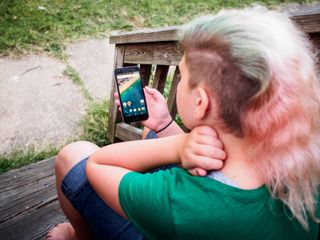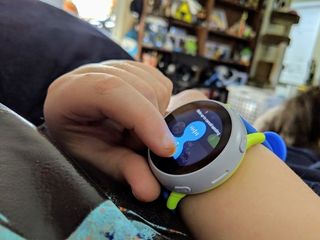How old should my child be when I give them their first phone?

Deciding when to give your child their first smartphone is a big decision. It's hard to go back once they've had a taste of internet access at that level of flexibility. Their occasional, supervised social media use via PC can turn into always-on, unsupervised social media use after switching to mobile. It's a scary spot to be in for parents that on the one hand want to protect their kids from the uglier side of the internet while also providing them access to all of its benefits. Let's go through some of the factors to weigh when making the decision that's right for you.
Socializing
It's a necessity for healthy development for your child to be able to freely network with their peer group. So when recent research shows that 50% of kids have social media accounts by age 12, letting your kid have a phone for Instagram, Facebook, or other networks isn't just a luxury, it can be a key point of integrating with their peer group.
The real antidote to cyberbullying is education.
Of course, the modern social landscape is fraught with pitfalls. 28% of students report having experienced cyberbullying in their lives at some point. There's a significant overlap between those who have been bullied offline as well as online, so you may not necessarily be saving your child from hardship by denying them a smartphone. On the other side of the coin, a smartphone also gives a child the ability to commit cyberbullying themselves. A mobile device is easy to squirrel away and use in private, making the parent's job of digital diligence that much harder.
Online anonymity not only shelters cyberbullies, but also external threats. It doesn't take many episodes of Chris Hansen's show to freak a parent out and get them to lock down any and every communication tool at a child's disposal. The real antidote here is education. Teaching kids the warning signs of a threat, and cultivating a conservative online presence with few points of contact are a great start to preventing abuse by those outside of your child's immediate social sphere.

School
When it comes to education, it's hard to deny your kid access to the wealth of human knowledge at their fingertips, and that's precisely what their first smartphone will give them. They'll have internet access through tablets and computers too, but the immediacy of mobile means they can learn about something the millisecond a question pops into their head.
How valuable is a moment where you don't have to mind your child?
Whatever problems they're having in their coursework, there are likely many well-produced videos to answer their question in a way that's more engaging and succinct than you or your child's teacher could deliver. The more access your child has to these kinds resources, the better.
The downside of the absolute glut of information online is that your child stands to be learning from many unverified sources. These can lay the root for ideas that are either misinformed or downright toxic. Policing these sources as a parent is a little unsustainable, but ensuring your child gives credence to what they're learning in school versus the first thing that pops up in Google is a prudent step to take before getting them their first phone.
Be an expert in 5 minutes
Get the latest news from Android Central, your trusted companion in the world of Android
Entertainment
Parents, how valuable is a moment where you don't have to mind your child? Where they stay quietly in one spot for at least a half hour? Letting your child take in an educational show or game on their own without you having to keep tabs on them can be just the break you need. It can also act as a great incentive to behave well.
Over time however this can turn into a dependency that could make bedtime more difficult, or even just keeping your child engaged and conversational at dinner. Besides the immediate practical problems having a child a little too attached their phone, there are long-term consequences as well. Studies are indicating that children spending more than two hours in front of the screen each day can suffer long-term effects to their attention span.
Alternatives

Of course, you don't have to provide unfettered mobile access via smartphone; it is absolutely something you can ease into. The Dyno Smartwatch, for example, is a great option for kids in the 4 to 9 bracket. It affords communication with a few trusted contacts (namely parents and close family members) while cutting back on additional distractions and unknown social elements.
Tablets are a popular option as they tend to only see use in the home within Wi-Fi access areas. The bigger size makes them harder to lose, too.
Bottom line
There are no hard and fast rules here. There's a lot of wriggle room based on a parent's sensibilities and a child's attitude. That said, getting your kid their first smartphone sometime between the ages of 10 and 13 is considered acceptable. Once you've decided to bite the bullet, check out our roundup of the best phones for kids and some tips for keeping your kids safe online. Let us know in the comments when you think is the best age for kids to get their first smartphone. It's a sticky subject, so it's very helpful to hear where other parents are coming from.

